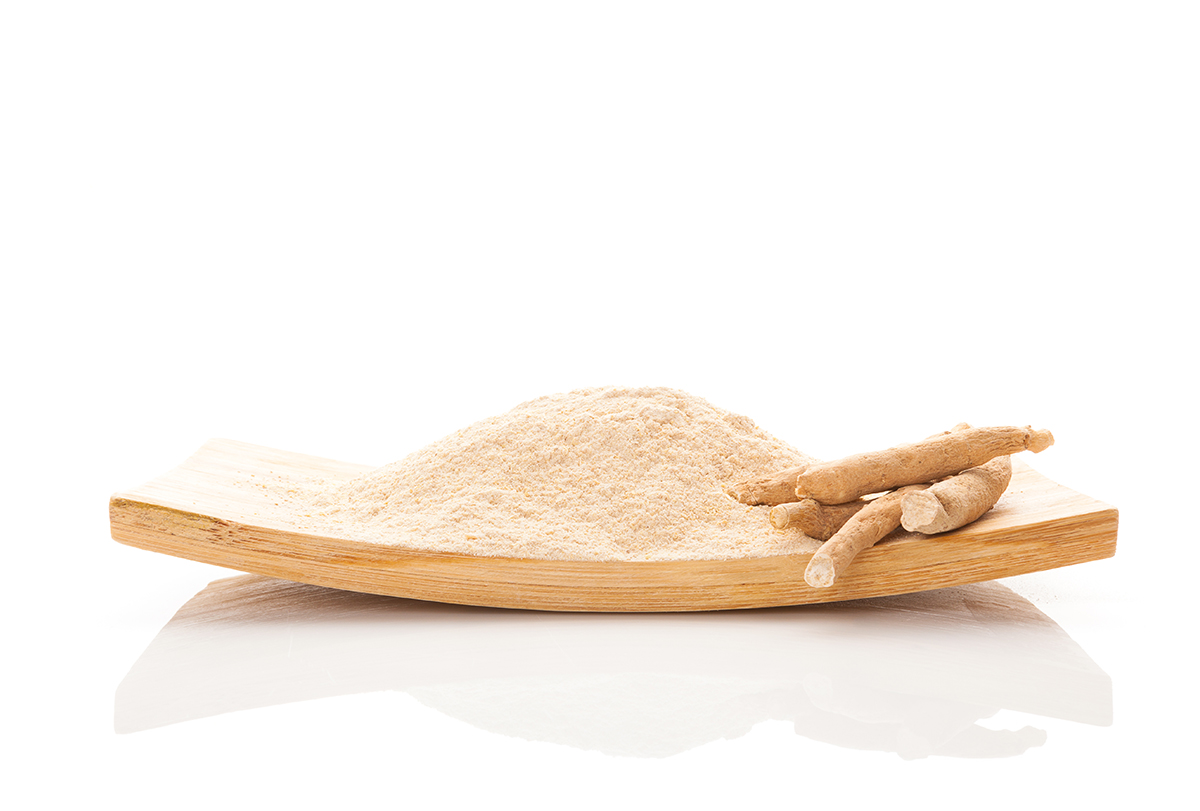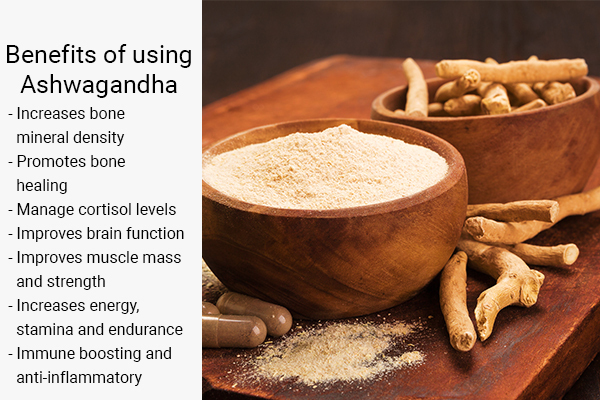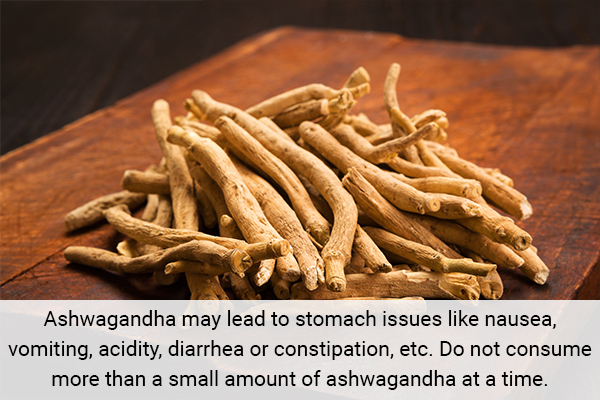In this article:
Your height is a genetic trait that is almost completely determined by your DNA. (1) Several studies show that although most of it depends on your genetics, a healthy diet and exercise boost growth hormones in the body and affect your height positively. (2)

Ashwagandha, also known as Indian ginseng, is a medicinal plant with widespread use in Ayurveda for its healing properties. (3)(4) It is filled with antioxidants and healing compounds that help lower stress, reduce blood sugar, and promote healthy growth.
Ashwagandha can promote the production of growth hormones in the pituitary gland and reduce stress and anxiety in the brain to help you grow to your maximum potential.
Science Behind Height Gain
Growing children and adolescents produce a hormone called the human growth hormone (HGH) in their pituitary glands. (5) HGH is the main hormone responsible for physical growth in a person.
It indirectly stimulates growth by triggering the production of insulin-like growth factor I (IGF-I) in the liver. (6) This helps produce cartilage that hardens to form longer bones and increase your height. (7)
Other hormones that affect your height include the thyroid hormone and androgens (estrogen and testosterone). (8) Your nutritional intake can assist this process and plays a role in determining your height. (9)
Factors Related to Height

The growth rate of the body is not the same for everyone. Some people reach their maximum height at 18, while others may continue to grow in their early 20s.
Generally, women can continue to grow for around 21 years, whereas men grow physically till they are 25. (10)
Some factors that affect growth include:
- Diet – Your food intake provides the necessary nutrients for your bones and muscles to grow.
- Exercise – Working out and being physically active as an adolescent help trigger hormone production in the body, making you taller and stronger.
- Posture – It is important to maintain proper posture while sitting and standing when you are growing to avoid the formation of bent bones.
Can Ashwagandha Increase Your Height?

Ashwagandha offers multiple benefits for your body. It has been proven to be beneficial in treating chronic stress and anxiety and reducing brain inflammation. It also helps treat metabolic disorders and hormone imbalances such as thyroid diseases and cortisol imbalance (stress hormone). (11)
However, not enough significant scientific evidence is available to suggest whether ashwagandha helps increase your height. Nevertheless, ashwagandha can help you maintain good posture and height as you age.
Bones tend to lose their bone mass and density as you grow older, causing your spine to shrink and bend. Ashwagandha can help prevent loss of bone mass and maintain strong bones and height.
Why Is Ashwagandha Used to Stimulate Height Gain?
Ashwagandha helps regulate stress and induce relaxation in the body. It affects growth in the following ways:
- Ashwagandha is filled with chemical compounds called withanolides, (12) which stimulate GABA production in the brain. GABA is a neurotransmitter that helps your mind and body relax by inhibiting nerve signals. (13) An increase in GABA levels indirectly leads to an increase in HGH levels in the body as this hormone is produced when your body is relaxed and sleeping. HGH promotes bone formation and muscle growth and makes you stronger. (14)
- Ashwagandha is rich in antioxidants that help reduce free radical damage to your body and promote healthy growth. (3)
- Ashwagandha helps promote bone density and strength due to its GABA-triggering properties. (15) Thus, it is widely used as a supplement by athletes.
Ashwagandha is a stimulant and will not magically cause a significant increase in your height. It is necessary to consume a healthy, calcium- and protein-filled diet, exercise regularly, and follow healthy a routine in your teen years to increase growth.
What Is the Right Dosage of Ashwagandha for Height Gain?
Ashwagandha may not directly cause significant changes in your height but it can help increase bone density and strength. Ashwagandha is also useful for people suffering from bone diseases or injuries.
Ashwagandha root extract can be consumed in the form of one or two 500 mg capsules a day.
Note that some Ayurvedic medicines may interact with the medicines you are taking, so it is advisable to consult a doctor before taking ashwagandha.
How to use:
- Combine 10 mg of ashwagandha and 10 ml of water. Drink this mixture after meals once or twice a day. Consume regularly for at least 3–4 months for maximum benefits.
- Ashwagandha can be consumed in the form of a powder or extract. Mix ½ teaspoon with warm milk and honey and drink this mixture at night.
- Ashwagandha can also be consumed as premade capsules, churna, tea, or shakes.
Benefits of Using Ashwagandha
Ashwagandha offers the following health benefits:

- Increases bone mineral density: Osteoporosis in old age can lead to loss of bone mass and minerals. This causes weakened bones and joint pains. Consuming ashwagandha regularly can help reverse and prevent this problem. Ashwagandha promotes increased bone density and mineral deposits.
- Supports bone healing: Ashwagandha can stop the breakdown of proteins, thus supporting bone healing and muscle repair.
- Strengthens bones: Ashwagandha helps improve bone strength by increasing bone density and mass.
- Manages cortisol levels: Cortisol is also known as the “stress” hormone. It leads to hyperglycemia and weight gain. Ashwagandha helps decrease cortisol levels in the body.
- Improves brain function: Ashwagandha is found to be especially beneficial for people suffering from brain-related conditions such as Parkinson’s disease and depression. It helps reduce brain swelling and improves memory.
- Improves muscle mass and strength: Ashwagandha helps increase the levels of testosterone and growth hormone in the body. This leads to increased muscle strength and helps repair muscle damage.
- Increases energy, stamina, and endurance: Ashwagandha can help improve your physical health by boosting heart and lung functions. It can make you more energetic and reduce chronic fatigue.
- Provides immune-boosting and anti-inflammatory effects: Ashwagandha contains anti-inflammatory compounds that help curb inflammation and swelling, especially in the brain. It also boosts the body’s defense mechanism by improving cell-mediated immunity.
- Exhibits anticancer properties: Ashwagandha is filled with antioxidants that can help prevent the growth of cancers and tumors.
Side Effects of Ashwagandha

Ashwagandha is mostly safe as it is a natural plant compound, but its use may sometimes lead to some side effects.
Here are some common side effects of ashwagandha:
- Ashwagandha may lead to gastrointestinal issues such as nausea, vomiting, acidity, diarrhea, and constipation. Do not consume more than the recommended amount of ashwagandha at a time.
- Ashwagandha is not recommended for use in pregnancy or when breastfeeding.
- Ashwagandha may increase testosterone levels in the body and cause headaches, dizziness, etc.
- People suffering from autoimmune diseases such as rheumatoid arthritis, type 1 diabetes, etc., should not take ashwagandha.
Note: Consult your doctor before using ashwagandha. It is not recommended to substitute any ongoing medical treatments with ashwagandha.
Lifestyle Changes and Tips
- Do not take any steroids to encourage growth as an adolescent.
- Eat foods rich in vitamin D and calcium for bone health.
- Reduce intake of excessive oil and sugar.
- Work out or participate in sports regularly. Swimming, stretching, basketball, hanging exercises, etc., are all good for growing kids.
- Sleep for at least 7–8 hours every day.
- Do not smoke or consume excessive tea.
- Avoid the use of intoxicants such as alcohol and drugs as these can affect your growth.
- Make sure to include foods that contain zinc in your diet, such as chocolate, fish, and eggs.
- Drink adequate amounts of water every day. Water helps flush out toxins from the body.
- Consume dairy products as they provide protein and calcium.
- Do not slouch when sitting or walking. Maintain proper posture during your growth years to allow the proper growth of bones. Always keep your back straight and shoulders drawn back a little.
Most-Asked Questions About Ashwagandha for Height Gain
How do I take ashwagandha supplements without messing with my thyroid levels?
Do not use ashwagandha without consulting a doctor for advice if you suffer from any thyroid diseases.
How long does it take for ashwagandha to work?
Ashwagandha may work sooner for some people than others, depending on the condition of each person.
What does ashwagandha do for the body?
Ashwagandha contains several beneficial compounds such as alkaloids (including isopelletierine and anabygrine), withanolides, and saponins. These substances help reduce stress, promote relaxation, fight inflammation, and boost brain health.
The antioxidants in ashwagandha help reduce oxidative stress on the body and provide antitumor effects.
Ashwagandha is helpful in several brain conditions such as Parkinson’s disease, dementia, and chronic stress. (15)
Can ashwagandha cause weight gain?
Unlike allopathic antidepressants and stress medications, ashwagandha is a natural substance and does not cause weight gain. However, it may reduce muscle wastage due to stress and anxiety.
Is Ashwagandha safe to take in the long term?
Ashwagandha is a mostly safe supplement with little to no side effects. However, more research is needed to know its exact effects on the body, and thus, it should only be used in small quantities.
When should I take ashwagandha for anxiety?
Ashwagandha can be beneficial for people who suffer from chronic anxiety or stress. It helps decrease cortisol levels in the body. Cortisol is a stress hormone, and lowering it can help reduce stress and depression.
Final Word
Ashwagandha has been used in Indian traditional medicine for centuries. Although there is no scientific evidence indicating its effects on growth, anecdotal evidence is plenty.
It is important to note that several studies need to be carried out before all the benefits and side effects of ashwagandha can be fully comprehended. Thus, if you do decide to give ashwagandha a try, make sure to consume it in small quantities and do not overdose on the herb as it may lead to stomach issues.
- Was this article helpful?
- YES, THANKS!NOT REALLY


